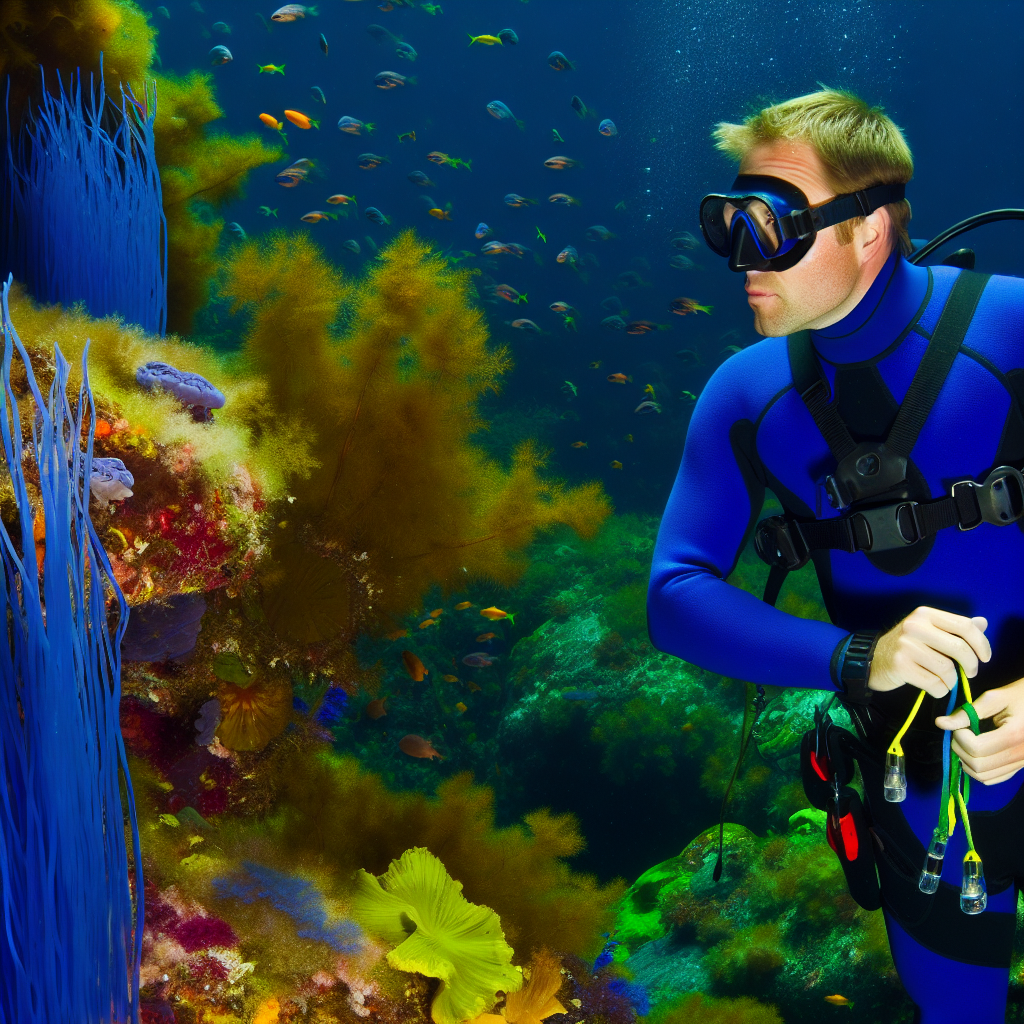Overview of Marine Biology: Definition and Scope
Marine biology is the study of ocean life and aquatic ecosystems.
This scientific field explores the interactions between organisms and their environments.
Marine biologists focus on everything from microscopic phytoplankton to large mammals.
They study various habitats such as coral reefs, deep-sea environments, and coastal ecosystems.
The Importance of Marine Biology
Understanding marine biology helps us tackle environmental challenges.
Marine ecosystems provide essential services, including oxygen production and carbon dioxide absorption.
Additionally, these ecosystems support food webs and global biodiversity.
Marine biology also plays a crucial role in fisheries management and conservation efforts.
Areas of Specialization in Marine Biology
Marine biologists may specialize in various sub-disciplines.
Some focus on marine ecology, studying interactions among organisms.
Others may work in marine conservation, protecting endangered species and habitats.
Still, others concentrate on marine microbiology or oceanography.
Career Opportunities in Canada
Canada offers numerous opportunities for aspiring marine biologists.
Research positions abound in universities, government agencies, and NGOs.
Organizations like the Ocean Tracking Network seek skilled professionals.
Fieldwork as a marine biologist also allows exploration of Canada’s vast coastlines.
Importance of Marine Biology in Understanding Ecosystems
Role of Marine Biology
Marine biology plays a vital role in understanding our oceans.
It examines the intricate relationships within aquatic ecosystems.
This field investigates species interactions and habitat dynamics.
Moreover, it supports conservation efforts for marine biodiversity.
Impact on Ecosystem Health
Healthy ecosystems are essential for regulating the planet’s climate.
Marine biologists contribute to monitoring ocean health.
They assess the impact of human activities on marine life.
Consequently, their work informs policies for sustainable practices.
Contributing to Global Knowledge
Research in marine biology enhances our understanding of global processes.
Unlock Your Career Potential
Visualize a clear path to success with our tailored Career Consulting service. Personalized insights in just 1-3 days.
Get StartedIt helps us learn how oceans influence weather patterns.
Additionally, it sheds light on carbon sequestration mechanisms.
This knowledge is crucial for addressing climate change challenges.
Education and Awareness
Marine biology promotes public awareness about ocean conservation.
Education initiatives encourage sustainable practices among communities.
Engagement with the public fosters a sense of responsibility.
Ultimately, informed citizens can drive positive change.
Educational Pathways for Marine Biologists in Canada
Understanding Required Qualifications
Pursuing a career in marine biology begins with education.
An undergraduate degree in biology or environmental science is essential.
Many universities offer specialized marine biology programs.
Furthermore, completing a Bachelor of Science degree lays a solid foundation.
Advanced Education Opportunities
A Master’s degree increases expertise in marine biology.
Students often focus on research or specific marine ecosystems.
Additionally, a PhD is necessary for academic or advanced research positions.
This level of education allows for significant contributions to the field.
Essential Skills Development
Marine biologists need strong analytical skills.
Fieldwork experience enhances practical understanding of marine species.
Moreover, skills in data analysis are increasingly important.
These skills facilitate effective research and reporting.
Field Experience and Internships
Internships provide valuable real-world experience.
Many institutions and organizations offer internship programs.
Participating in these programs helps build a professional network.
Field experience also enhances curriculum vitae and job prospects.
Certification and Continuing Education
Certifications can enhance career opportunities in marine biology.
For instance, becoming a Certified Marine Biologist is beneficial.
Additionally, attending workshops and seminars helps professionals stay current.
Continuing education enriches knowledge and skills in this evolving field.
Gain More Insights: Day in the Life of a Canadian Geologist
Key Institutions and Research Centers for Marine Biology in Canada
Overview of Marine Biology Research in Canada
Canada boasts a rich maritime heritage and extensive coastlines.
Numerous institutions focus on marine biology and aquatic ecosystems.
These organizations contribute significantly to research and conservation efforts.
Top Research Institutions
-
Memorial University of Newfoundland
This university hosts the Ocean Sciences Centre.
It focuses on marine ecology and behavior studies.
-
University of British Columbia
UBC’s Institute for the Oceans and Fisheries is well-respected.
Research here emphasizes fisheries management and ocean health.
-
Dalhousie University
Dalhousie is known for its Marine Affairs Program.
This program merges marine science and policy considerations.
Key Organizations and Their Contributions
-
Fisheries and Oceans Canada
This federal department plays a vital role in marine research.
It manages Canada’s fisheries and aquatic ecosystems.
-
Ocean Networks Canada
They provide extensive ocean monitoring initiatives.
This organization supports collaborative research projects.
-
Canadian Wildlife Federation
The federation focuses on aquatic species conservation.
It engages the public in marine education and outreach.
Marine Research Collaborations
Collaboration enhances the effectiveness of marine research.
Various institutions work together across regions.
These partnerships often lead to groundbreaking discoveries.
Training and Educational Opportunities
Several programs prepare students for careers in marine biology.
Internships and fieldwork are integral to curriculum design.
Students gain hands-on experience in marine environments.
Moreover, workshops and seminars offer additional training.
Gain More Insights: Canada’s Role in Space Exploration: New Opportunities in Research and Development
Common Marine Biology Careers: Roles and Responsibilities
Marine Biologist
A marine biologist studies ocean ecosystems and marine life.
They conduct field and laboratory research.
Additionally, they analyze data to understand aquatic organisms.
Marine biologists may specialize in a particular species or habitat.
They also work to conserve endangered marine species.
Conservation Scientist
A conservation scientist focuses on protecting aquatic ecosystems.
They develop conservation plans to ensure sustainable practices.
Moreover, they collaborate with government agencies and NGOs.
Their role involves monitoring environmental policies and regulations.
They also educate the public about marine conservation efforts.
Marine Technician
Marine technicians handle equipment used in oceanographic research.
They operate and maintain vessels and underwater instruments.
Furthermore, they assist scientists in collecting samples.
Their work is crucial for ensuring data accuracy during studies.
They may also analyze samples in laboratory settings.
Aquarist
An aquarist manages aquariums and aquatic facilities.
They care for marine animals and maintain exhibit environments.
Additionally, aquarists educate visitors about marine life.
Their role includes monitoring water quality and animal health.
They often participate in breeding programs for endangered species.
Marine Policy Analyst
A marine policy analyst evaluates policies affecting ocean use.
They research the impact of regulations on marine ecosystems.
Moreover, they provide recommendations for sustainable practices.
Their work often involves collaboration with policymakers and stakeholders.
They also engage in public advocacy to promote marine issues.
Explore Further: Exploring the Impact of AI in Canadian Scientific Research Careers

Conservation and Environmental Impact: Marine Biology’s Role
Importance of Marine Biology
Marine biology plays a critical role in understanding ocean ecosystems.
It examines how species interact and adapt to their environment.
Furthermore, it helps identify threats to marine life.
This field provides invaluable data for conservation efforts.
Conservation Strategies
Effective conservation strategies stem from thorough research.
Scientists, like Dr. Emily Carter, focus on habitat restoration projects.
Collaborations with organizations, such as Ocean Conservancy, enhance these efforts.
Additionally, marine protected areas offer safe havens for endangered species.
Addressing Climate Change
Climate change significantly impacts marine ecosystems.
In fact, rising sea temperatures affect species distribution.
Marine biologists study these changes to develop mitigation strategies.
For example, Dr. Liam Patel researches coral resilience to heat stress.
Community Engagement
Community involvement is vital for successful conservation.
Educational programs raise awareness about marine issues.
Local organizations, such as Blue Shore Society, engage volunteers in clean-up efforts.
This active participation fosters a sense of stewardship for marine environments.
Research and Academic Contributions
Universities in Canada contribute significantly to marine biology research.
Institutions like the University of British Columbia lead innovative studies.
Research findings inform policy decisions and conservation practices.
Moreover, interdisciplinary approaches enrich understanding of marine issues.
Learn More: How to Get Ahead in Canada’s Biomedical Research Sector
Challenges and Opportunities in Marine Biology Careers in Canada
Current Challenges Facing Marine Biologists
Marine biology careers in Canada face various challenges today.
Funding for marine research often varies by project.
Competition for grants can be fierce among researchers.
Furthermore, environmental changes complicate research efforts.
Pollution and climate change threaten aquatic ecosystems.
These pressures demand innovative solutions from marine biologists.
Job Market Dynamics
The job market in marine biology presents both challenges and opportunities.
On one hand, positions in academia can be limited.
Conversely, industry roles in biotechnology are on the rise.
Increasing awareness of marine conservation opens more paths.
This growth leads to numerous collaborations in different sectors.
Skills in Demand
To succeed, marine biologists need a diverse skill set.
Analytical skills are essential for data interpretation.
Fieldwork experience provides practical knowledge of methods.
Communication skills help convey research findings effectively.
Moreover, interdisciplinary knowledge in technology and ecology is valuable.
Opportunities for Advancement
Continuous learning can enhance career prospects in marine biology.
Engaging in further education opens new opportunities for advancement.
Networking with professionals can lead to valuable collaborations.
Involvement in marine conservation programs enriches experience.
These initiatives pave the way for leadership roles in the field.
The Importance of Community Involvement
Community involvement can also benefit marine biology careers.
Working with local organizations fosters awareness and support.
Education programs help inform the public about marine issues.
Volunteer opportunities can lead to job prospects in the sector.
Ultimately, building connections within the community is crucial.
Future Trends in Marine Research and Impact on Job Market
Innovative Technologies in Marine Research
Technological advancements significantly shape marine research today.
Remote sensing tools improve the ability to monitor marine ecosystems.
Furthermore, artificial intelligence helps analyze complex data sets.
The rise of autonomous underwater vehicles transforms data collection.
These technologies enhance efficiency in conducting research globally.
Emerging Areas of Research
Climate change remains a critical focus for marine biologists.
Understanding ocean acidification is essential for marine life survival.
Additionally, biodiversity studies inform conservation efforts.
Research on microplastics and their impact has gained prominence.
Moreover, the studies aim to optimize sustainable fishing practices.
Impact on Job Market Dynamics
As marine research evolves, so do job opportunities within the field.
New positions emerge, particularly in data analysis and technology integration.
Furthermore, interdisciplinary roles combining biology and technology are growing.
Positions focused on conservation efforts are becoming increasingly relevant.
Consequently, educational programs must adapt to these trends.
Collaboration Between Sectors
Partnerships between academic institutions and industry are crucial.
These collaborations foster practical research applications in the marine sector.
Additionally, stakeholders are more involved in conservation initiatives.
Public-private partnerships can effectively address marine challenges.
They also contribute to developing skills essential for new roles.
Global Perspectives on Marine Careers
Marine biology careers in Canada benefit from a global viewpoint.
Opportunities can arise from international research collaborations.
Shared knowledge enhances innovations in marine science practices.
Finally, understanding global trends prepares professionals for future challenges.




